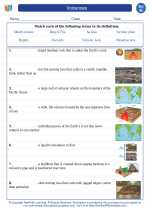Volcanoes -> white blood cells
White Blood Cells
White blood cells (WBCs), also called leukocytes, are a crucial part of the immune system. They help the body fight off infections and foreign invaders.
Types of White Blood Cells
There are several types of white blood cells, each with specific roles in the immune response:
- Neutrophils: These are the most abundant type of WBCs and are the first responders to infections.
- Lymphocytes: These cells are responsible for targeted immune responses, including the production of antibodies.
- Monocytes: They are responsible for removing dead or damaged cells and help in the immune response to pathogens.
- Eosinophils: These cells are involved in fighting parasitic infections and are also involved in allergic responses.
- Basophils: They release chemicals like histamine in response to allergens and play a role in inflammatory reactions.
Functions of White Blood Cells
White blood cells play several important roles in the body's defense against pathogens:
- Phagocytosis: Some WBCs engulf and digest foreign invaders and cellular debris.
- Production of antibodies: Lymphocytes produce antibodies that specifically target and neutralize pathogens.
- Release of cytokines: WBCs release signaling molecules that regulate the immune response.
- Immune surveillance: WBCs patrol the body, identifying and destroying abnormal cells such as cancer cells.
Disorders Related to White Blood Cells
Imbalances in white blood cell counts can indicate health issues, such as:
- Leukopenia: Abnormally low WBC count, which can increase the risk of infections.
- Leukocytosis: Abnormally high WBC count, often seen in response to infections or inflammation.
- Leukemia: A type of cancer that affects the blood and bone marrow, causing uncontrolled production of abnormal white blood cells.
Study Guide
When studying white blood cells, focus on understanding the different types of WBCs and their specific functions. Pay attention to how white blood cells contribute to the body's immune response and how imbalances in WBC counts can indicate health issues.
Practice identifying the different types of white blood cells and their roles in the immune system. Additionally, familiarize yourself with common disorders related to white blood cells and their potential causes and effects.
[White Blood Cells] Related Worksheets and Study Guides:
.◂Science Worksheets and Study Guides Eighth Grade. Volcanoes
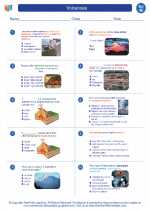
 Worksheet/Answer key
Worksheet/Answer key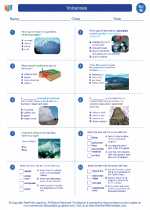
 Worksheet/Answer key
Worksheet/Answer key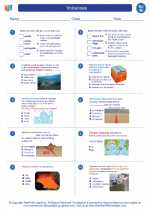
 Vocabulary/Answer key
Vocabulary/Answer key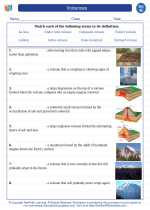
 Vocabulary/Answer key
Vocabulary/Answer key
 Vocabulary/Answer key
Vocabulary/Answer key